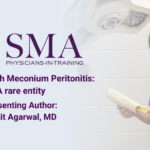Abstract | May 6, 2021
A Preterm with Meconium Peritonitis: A rare entity
Introduction:
Meconium peritonitis (MP) is aseptic chemical peritonitis that results from intrauterine perforation of the bowel and exudation of meconium into the peritoneal cavity. The causes of MP include bowel obstruction due to stricture, atresia, volvulus, intussusception, and meconium plug syndrome from cystic fibrosis. All cases of MP have the same etiology; perforation of the intestine in utero and intraperitoneal inflammation by spillage of meconium. Meconium is a complex mixture of bile salts, cell debris, and proteins. Spillage of these constituents has been shown to activate immune cells including macrophages. Macrophages infiltrate into the peritoneum, and participate in a range of cellular functions, including phagocytosis, the release of chemical mediators and antibody‐dependent cell‐mediated cytotoxicity. If the sealing of the perforation does not occur, huge abdominal cyst formation and progressive pro‐inflammatory cytokine reaction with ascites collection may cause fetal cardiac insufficiency, preterm labor, and a poor general condition after birth.
The estimated prevalence of MP is around 1 in 35000, with a slight male predominance. It is classified into three groups as per antenatal USG findings, Type I: large meconium ascites, Type II: large pseudocyst, Type III: Intra‐ abdominal calcifications, small meconium ascites, and/or a shrinking pseudocyst. The survival rate for MP has increased from 10‐40% to 80‐92% due to advances in perinatal care and surgical management. The diagnosis can be made with ultrasound or by abdominal x‐ray, with varied images, altering according to the etiology of the obstruction/perforation.
Case Presentation:
A 1,700‐gm female infant was born at 29 weeks of gestation to a 24‐year‐old primi mother by vaginal delivery. The presentation was cephalic and the amniotic fluid was clear. Antenatal USG scan at 20 weeks of gestation was normal. Follow up scans were not done. The mother’s serum HBsAg and HIV were negative. The APGAR scores were 5 and 7 at 1 and 5 minutes respectively. On physical examination, the patient had poor muscle tone, slow and irregular respiration, and the abdomen was firm and grossly distended with visible dilated veins. The patient was intubated and received a dose of surfactant in the delivery room and was transferred to the NICU. Her length, head circumference, body temperature, pulse, and arterial blood pressure were determined to be 45 cm, 30 cm, 36.3°C (axillary), 148/min, and 50/32 mm Hg, respectively. The patient was started on mechanical ventilation. An orogastric tube was placed. X‐ray abdomen showed free gas in the abdomen. From laboratory examinations, hemoglobin and white cell count were determined to be 14.4 g/dL and 18 300/mm3. Renal and liver function tests were normal. 2‐D echocardiography did not show any congenital cardiac abnormality. Newborn screening was negative for cystic fibrosis. She was kept NPO (nothing by mouth) and total parenteral nutrition was started. Piperacillin/Tazobactam was administered and dobutamine infusion was started for hypotension.
Final Diagnosis:
Type I meconium peritonitis.
Management/Outcome:
Pediatric surgery was consulted and it was decided to perform the abdominal drainage procedure, enterostomy, and elective closure of the stoma. Approximately 150 ml of meconium‐stained fluid was drained by the abdominal drain. After 24 hours of abdominal drainage, an exploratory laparotomy was performed, and the perforation was found to be at the ileum. Enterostomy was performed and orogastric feed was started after five days of the surgery. The feeds were gradually advanced to the full feeds. The patient tolerated the feeds and was discharged at 35 weeks postmenstrual age.
Learning Objectives:
Meconium peritonitis is a rare condition with many complications. The condition has a good survival rate if identified and treated timely. Therefore, meconium peritonitis should always be suspected in neonates when the USG and X‐ray show abdominal ascites and/or perforation. Neonates with MP should be screened for cystic fibrosis given the strong association between these two medical conditions.

